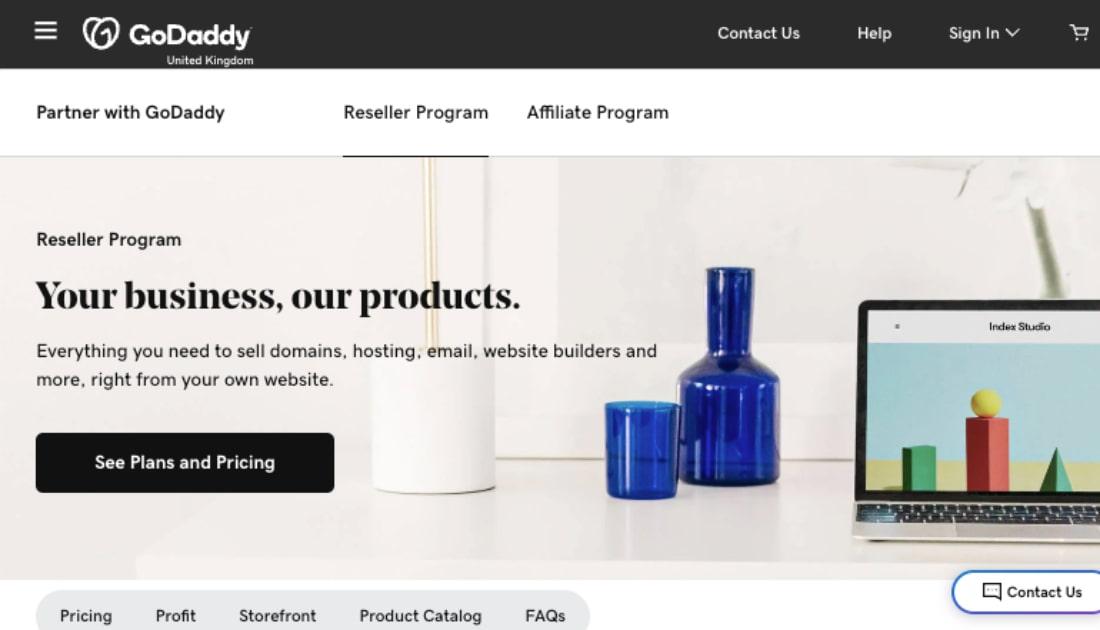Conventional wisdom recommends optimizing your success in the web design business by splitting income into three buckets: project work, recurring revenue, and passive income.
A reseller program is the perfect example of passive income.
By reselling services provided by others, you earn commissions on initial sales, and even better, on renewal fees. Sell once and reap rewards in subsequent years: think domains, hosting, security products, email, and more.
This sounds great for those already established as resellers. However, if you’re new to the concept, getting started might sound overwhelming. To ease into it, let’s focus on two initial steps:
- Establish your reseller presence
- Define your sales and marketing strategy
Establish your reseller presence
Set up your reseller account
With GoDaddy’s Reseller program, you’re selling the longstanding reputation of a well-known service provider — with your brand front and centre. Once set up, it’s fairly hands-off and stress-free, as GoDaddy provides the storefront mechanics, customer support, and billing.
Identify your storefront platform and domain
GoDaddy’s reseller program provides flexibility. One option is the built-in storefront branding, where you control the domain name, site logo, colour scheme, page layout, and more. If you’re experienced with WordPress, you can create a fully customized site using their special WordPress plugin.
Evaluate options for products and pricing
Resellers choose which products to offer, including domains, hosting, email, SSLs, security, and Managed WordPress. In addition, resellers can set their own pricing for products and services, offer special deals or promotions, and provide discount pricing to individual customers. It’s easy to start with the default recommendations, then refine your strategy going forward.
Decide how you’ll provide customer support
While many who run reseller operations are qualified to manage technical support for their customers, GoDaddy’s dedicated team is there to support reseller customers 24/7 by phone or email, all under the umbrella of your brand.
Check out available expert resources
Concerned you’ll have questions? Don’t worry, GoDaddy has you covered, with multiple resources at the ready:
- The GoDaddy Reseller Resource Portallets you hear from experts on how to find customers, manage social media, optimize pricing, and more.
- Get the most out of GoDaddy Resellerprovides additional insight into making the most out of your new venture, including detailed video explanations.
Define your sales and marketing strategy
Once your reseller marketplace is ready to go, the fun begins. Having a sales and marketing strategy from the beginning will help you achieve results faster.
Clarify your financial goals
How much income would you like to make? What percentage of your income do you anticipate coming from reselling? You’ll want to look at typical commissions based on products and do some reverse engineering to figure out what sort of sales quota you need to meet to earn that amount.
Identify your target audience
Your audience might be defined by a niche business type, the business demographics (small biz, solopreneur, virtual vs. in-person), or geography (selling in a specific region). Once you’ve identified a new segmented market area, you’ll want to focus advertising and networking efforts to get the word out. Establishing yourself as the go-to reseller in a tightly networked market can lead to more sales, as recommendations are trusted from others in that market.
Polish up your selling points
Have your sales pitch ready to easily answer questions during any conversation. Get comfortable explaining the value of your provided solution. Assuming you use the services you’re reselling, you can attest to your own positive results.
Be on the lookout for options to slip the topic into conversation.
If someone mentions they’re unhappy with their current service provider, it’s your chance to ask why they’re unhappy — leading to an opportunity to show how your offerings provide value while addressing their concerns.
In addition to current clients, how will you find and approach potential new customers? Think about how you’ll get the word out to folks you don’t personally interact with. You might consider establishing a social media presence and offering additional services that differentiate your business.
Look for ways to bring current clients on board
If you’re onboarding new web design clients, you have an opportunity to offer domains, hosting, and more as an additional benefit of partnering with you. For existing clients, if their hosting or services with another provider are expiring soon, it could be the right time to suggest a switch, rather than renewing the existing services.
Set pricing goals and track results
GoDaddy’s reseller platform makes it easy to enable or disable discount pricing for specific customers. If your marketing plan includes special discount codes, you’ll want to track how many people used the code and compare it with your goals.
If goals are not met, you may need to rethink the marketing strategy in terms of promoting it via emails or social media. In addition, perhaps your discount was not reaching the right audience who would want to use it, so that’s an opportunity to re-focus.
Plan consistent follow-up communication
Personal contact boosts client confidence in the products you’re selling. Once you’ve onboarded customers into your reseller business, your personalized efforts remind them you’ve got their back. Reach out post-purchase to make sure they’re comfortable with their new products and services. Then touch base regularly, emphasizing your availability.
In Conclusion
To summarize the getting-started process:
- Set up your reseller account
- Identify your storefront platform and domain
- Identify options for products and pricing
- Decide how you’ll provide customer support
- Check out available expert resources
- Clarify your financial goals
- Identify your target audience
- Polish up your selling points
- Look for ways to bring current clients on board
- Set pricing goals and track results
- Plan consistent follow-up communication







